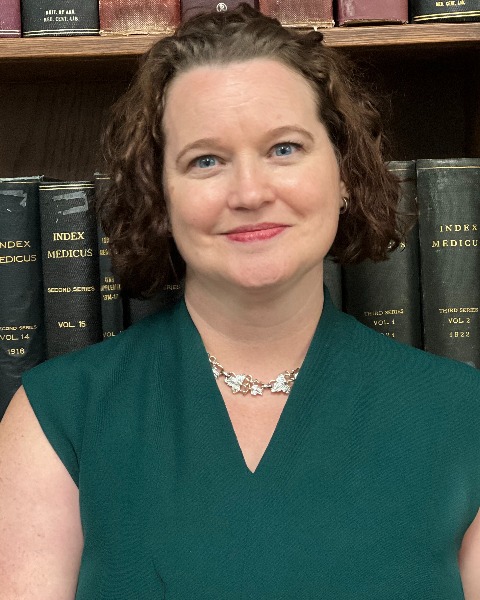Back
Paper: Research Abstract
Clinical Support
Session: Papers Virtual Session 6
Impact of Clinical Librarians at Patient Care Rounds on Residents Resource Use
Friday, April 29, 2022
4:00 PM – 4:15 PM CT

Lindsay E. Blake, AHIP
Clinical Services Coordinator
UAMS Library
Little Rock, Arkansas
Lauren Tong
Clinical Librarian
UAMS
Little Rock , Arkansas
Presenter and Author(s)
Objectives: The aim of this research study is to measure the impact of clinical librarians attending patient rounds with hospital care teams. Clinical librarians join resident lead teams during patient rounding to search for evidence-based literature pertaining to patient care. This information is used to support faculty teaching points, answer point of care questions, and provide research on in-depth medical issues. However, it is not always known if this information has aided in patient care management, confirmed previous care assessments, or supported educational sessions.
Methods: This research study utilized a survey which was distributed to all residents and fellows at the end of their inpatient rotations in which a clinical librarian was present. The clinical librarians distributed the survey to trainees at the end of each month-long rotation in Pediatrics, Pediatric Infectious Disease, Trauma, and Family Medicine. Brief demographic data including resident year of training, gender identity, and program were collected. Survey questions asked trainees to respond with their comfort level in using the clinical librarian service and how useful they found the information provided. The remainder of the questions look at how provided information is used in patient care and if it is used to make changes to patient care.
Results: Residents in all surveyed programs were frequent users of UpTodate as a primary resource followed by online search engines, PubMed, and LexiComp. Residents most frequently asked questions when clinical librarians were present, but also utilized email. Having a librarian on rounds increased comfort levels in asking questions, the number of questions asked and the number of answers found. Information provided by the clinical librarians affected patient care from diagnosis to treatment, with frequent help in drug and lab choices. Overall, residents appreciated the presence of a clinical librarian on rounds and the information they provided for patient care.
Conclusions: The survey had a 12.5% return rate, which severely limited our analysis. Overall demographics were slanted towards female residents from the Family Medicine program, though resident experience was split fairly evenly from Interns to Fellows. It was expected that the presence of a clinical librarian would encourage residents and fellows to ask more questions about patient care and this assumption appears to be true in our sample. Residents became comfortable with clinical librarians on rounds and this prompted them to ask more questions pertaining to patient care. However, the majority of questions are asked in-person, showing the importance of having a librarian present where residents work.
Methods: This research study utilized a survey which was distributed to all residents and fellows at the end of their inpatient rotations in which a clinical librarian was present. The clinical librarians distributed the survey to trainees at the end of each month-long rotation in Pediatrics, Pediatric Infectious Disease, Trauma, and Family Medicine. Brief demographic data including resident year of training, gender identity, and program were collected. Survey questions asked trainees to respond with their comfort level in using the clinical librarian service and how useful they found the information provided. The remainder of the questions look at how provided information is used in patient care and if it is used to make changes to patient care.
Results: Residents in all surveyed programs were frequent users of UpTodate as a primary resource followed by online search engines, PubMed, and LexiComp. Residents most frequently asked questions when clinical librarians were present, but also utilized email. Having a librarian on rounds increased comfort levels in asking questions, the number of questions asked and the number of answers found. Information provided by the clinical librarians affected patient care from diagnosis to treatment, with frequent help in drug and lab choices. Overall, residents appreciated the presence of a clinical librarian on rounds and the information they provided for patient care.
Conclusions: The survey had a 12.5% return rate, which severely limited our analysis. Overall demographics were slanted towards female residents from the Family Medicine program, though resident experience was split fairly evenly from Interns to Fellows. It was expected that the presence of a clinical librarian would encourage residents and fellows to ask more questions about patient care and this assumption appears to be true in our sample. Residents became comfortable with clinical librarians on rounds and this prompted them to ask more questions pertaining to patient care. However, the majority of questions are asked in-person, showing the importance of having a librarian present where residents work.

.png)

